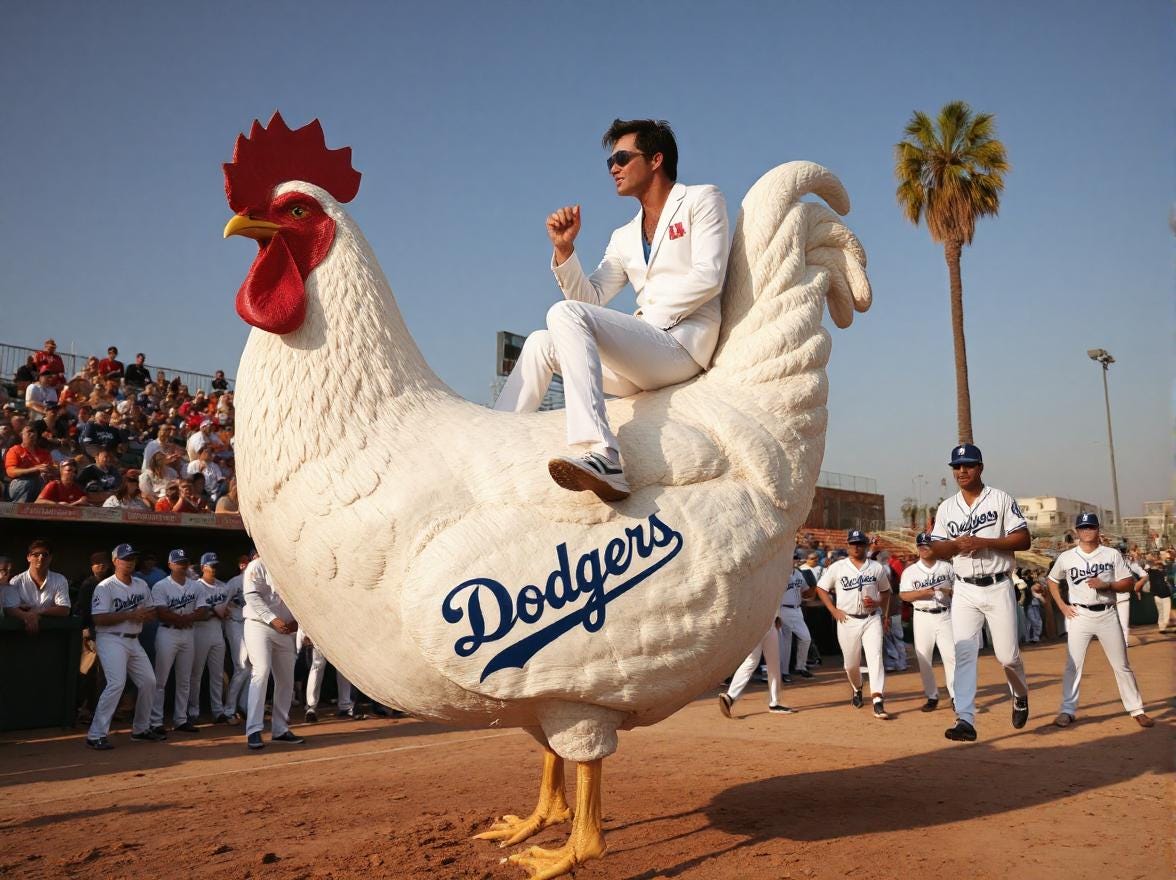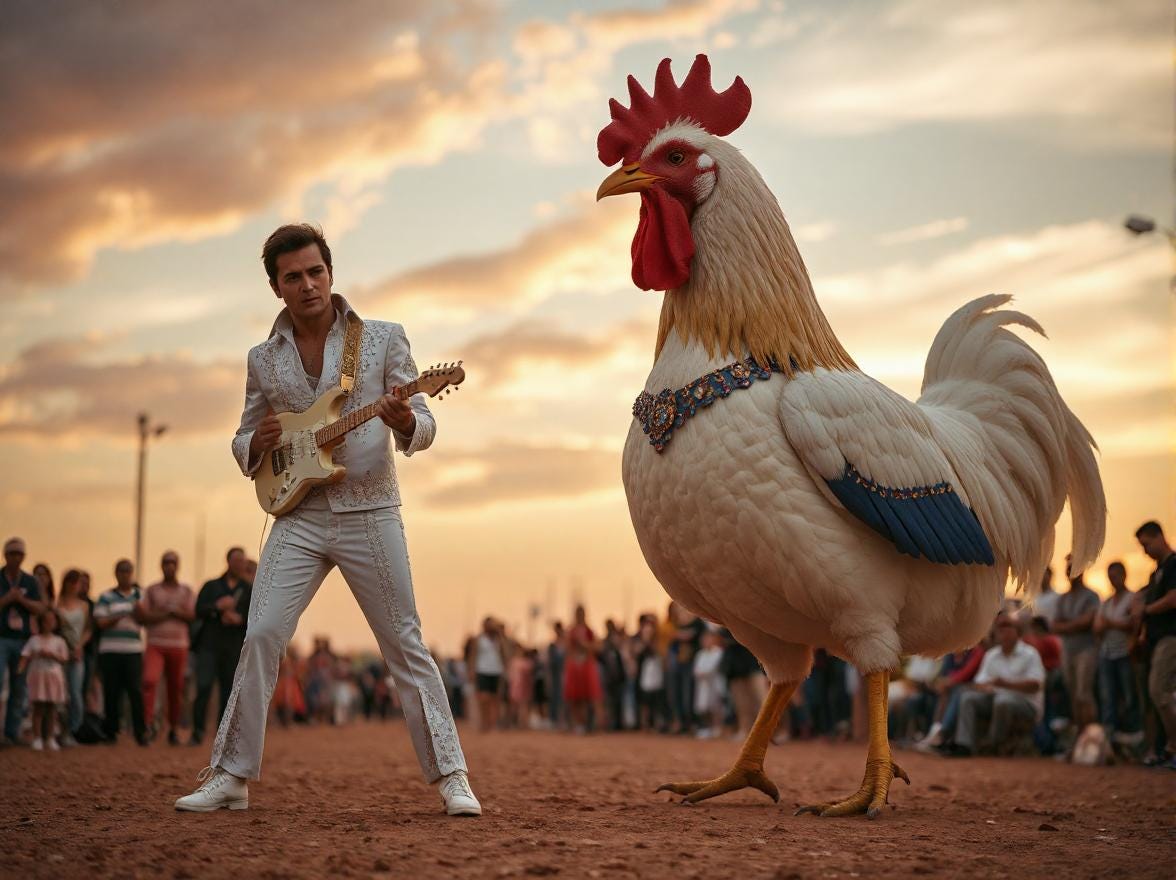Ciao everyone, Happy Wednesday, or whenever you happen to be reading this edition of Scene 7.
Today, we're diving into a topic that might seem a bit nerdy but is actually quite fascinating—the world of Hollywood contracts, specifically the provisions that dictate how an actor's credit is displayed on screen.
This isn't a dense legal review. Instead, it's a friendly and funny guide for anyone curious about how those names get to appear in the films we love. Whether you've never glanced at a contract or you're just interested in the behind-the-scenes of Hollywood, I hope you find this enlightening.
For each part of the contract provision (six), I'll briefly break it down into plain English to explain what's really going on. Remember, this isn't legal advice—it's just for fun (read that 7x) … featuring Elvis Chicken.
Ready, go!
Section 7. Credit.
part (a)
(a) Provided that the Talent is not terminated for an uncured material breach of this Agreement, the Talent shall be entitled to a SINGLE CARD screen credit in the MAIN TITLES of the Picture, as determined by the Producer in its sole and exclusive discretion, no less than second position among the cast of the Picture, in substantially the following form: STARRING ELVIS CHICKEN. The foregoing credit shall be in a size (meaning height, width, thickness, boldness, prominence, and duration) and type no less favorable than that accorded to any other individual credit in the Picture. All other aspects of the foregoing credit shall be at the Producer’s sole and exclusive discretion, and subject to any applicable distributor/licensee approval, foreign co-production and/or tax or treaty production rules, and/or guild/collective bargaining agreements.
Lee’s commentary to part (a)
Alright, let's unpack what section (a) of our Hollywood contract actually meant besides “WTF.”
So, when we talk about Elvis Chicken being entitled to a "SINGLE CARD" screen credit in the "MAIN TITLES" of the movie, it's all about how the name gets its own special moment on screen. A "single card" credit means the name appears alone on the screen, not shared with anyone else—kind of like having a guitar solo in a band, which is cool, no?
Now, "MAIN TITLES" are (usually) what you see at the start of the film. Being in the main titles is a big deal because it's where the top members of the cast and crew are. The phrase "no less than second position" ensures our hypothetical actor’s name comes up at least 2nd in the sequence of these credits, which is prime real estate.
I’ve used ALL CAPS for some terms here to make sure they stand out.
The contract also states the size and style of the Elvis Chicken credit will be just as prominent as the most noticeable credits given to anyone else in the film, which is a silly thing to negotiate, really, but it is what it is. The specifics of this credit are mainly up to the Producer, who still has to play by rules set by distributors, co-production agreements, and guilds.
So, in plain English: this part ensures Elvis Chicken gets a standout, visible credit early in the film. Isn’t it interesting how much thought goes into just a few seconds of screen time? You have not lived until you have argued with opposing counsel for two weeks about font size. #silly
part (b)
(b) If any other cast member is accorded credit above or before, or otherwise in connection with, the “artwork” title (if any) of the Picture, then the Talent shall also be entitled to receive credit above or before, or otherwise in connection with, the artwork title, as applicable, in the same position as on screen, and in a size, font, and position that is no less favorable than 100% of that accorded to such other cast member(s) (e.g., if any other cast member’s name is above the artwork title, the Talent’s name shall also be above the artwork title).
Lee’s commentary to part (b)
Section (b) deals with the "artwork title" of the movie, which is often a visually appealing or thematic title graphic you see in film trailers or the movie itself. It's the film's visual identity (best example = Star Wars).
So here, if any other actor gets their name displayed in a fancy way—say, right above or before this cool artwork title—Elvis Chicken gets the same. And it has to be in a position, size, and font that’s just as good—if not better—than the other cast members featured this way. A strategic evaluation and something entertainment lawyers, producers, and rogue agents get paid to figure out.
part (c)
(c) Provided that the Talent is not in uncured material breach of this Agreement, and the Talent's performance is included in the commercially released version of the Picture, the Talent shall be entitled to receive credit in the billing block portion of all customarily paid advertising, ancillary materials, and packaging (collectively, "Paid Ads"), issued by or under the direct control of the Producer. This entitlement excludes group, list, teaser, trailer, special advertising, and billboards of three (3) sheets or more, as well as advertisements of sixteen (16) column inches or smaller. Furthermore, this credit is subject to the customary exclusions and exceptions stipulated by the distributor(s) of the Picture (collectively, "Excluded Ads").
Lee’s commentary to part (c)
Here, we ensure if Elvis Chicken has not broken any major rules of the agreement and they appear in the film once it hits theaters, they'll get their name in the "billing block." This is that spot on movie posters and promotional materials where you see the list of big names, in crazy skinny font, involved in the movie.
Now, this doesn’t mean Elvis Chicken will appear in every single ad or piece of marketing material. This provision is about keeping things reasonable, making sure the Talent's name is included where it counts without making it an overwhelming task for the Producer to slap their name on absolutely everything.
Also, this deal needs to fit within any rules or special requirements set by the distributors. They sometimes have specific ways to handle advertising based on where and how the movie is shown. So, this part of the contract helps make sure everyone's on the same page, giving Elvis Chicken visibility without making things too complicated.
part (d)
(d) As used herein, "Excluded Ads" refers to the following forms of advertising and publicity: group, list, institutional, or teaser advertising; special advertising; advertising primarily about the author, any cast member, a producer, the director, or any other personnel involved with the production of the Picture; congratulatory advertisements, including those related to award considerations or nominations; advertising for film festivals and/or markets; advertising sixteen (16) column inches or smaller; outdoor advertising; trailers or any on-screen advertising, publicity, or exploitation; radio and television advertising; narrative advertising; theatre display advertising; advertising concerning subsidiary or ancillary rights of the Picture; advertising where the only credits are to the Production Company, its affiliates, or a financier or distributor of the Picture; advertising, publicity, and exploitation for by-products or commercial tie-ups; and other advertising not primarily related to the Picture.
Lee’s commentary to part (d)
Alrighty, let's talk about section (d). First, this particular contract language/definition has been around for a very very long time.
When the contract says "Excluded Ads," it's listing out all the types of advertising where it's okay if our Talent's name doesn’t pop up.
Think of it like the exception to the rule where the Elvis Chicken name should be shining bright.
These excluded types include a whole mix of ads where you might not typically expect to see detailed credits, like a teaser clip, or huge billboards where space and impact are more about the visual than the fine print. We've also got exclusions for ads that focus on celebrating something specific, like a big win at a festival or a nod towards an award nomination. And then there are ads that are tiny (like those sixteen column inches or smaller), which just aren't the right fit for squeezing in a full list of credits without turning it into an Bulgarian eye chart.
part (e)
(e) The Producer shall contractually require the distributor(s) of the Picture, including those distributing the Picture through digital and streaming platforms, to adhere to the credit obligations set forth herein. In the event of a failure to provide the applicable credit as stipulated, the Talent’s sole and exclusive remedy shall be to request the Producer to take specified corrective actions, such as reissuing promotional materials or issuing corrective notices, upon receipt of written notice, to prospectively cure such inadvertent failure, specifically with respect to prints and advertisements not yet produced.
Lee’s commentary to part (e)
This part of the contract ensures people showing our movie to the world, whether ton the big screens or streaming into living rooms, must stick to the rules about giving Elvis Chicken their credit.
But hey, nobody's perfect, right? If someone slips up and the Elvis Chicken name doesn’t show up where it should, this clause explains what Elvis Chicken can do in the event of a mistake, which is quite limited 95% of the time.
part (f)
(f) No casual or inadvertent failure, nor the failure of any third party, to give credit hereunder shall constitute a breach of this Agreement.
Lee’s commentary to part (f)
This provison gives every non-entertainment lawyer a headache the first time they see it. They assume it is trickery or witchcraft.
But alas, this provision is in every film and televison production agreement, full stop. Basically, it acknowledges credit mistakes happen, and not every mistake should or can lead to a lawsuit or a major contract dispute. Without this, a credit mistake could lead to an economic catastrophe.
***
OK cats, that completes today’s Scene 7. If you like this article, please tap the little digital heart/like button in the corner and shout, “yay!”
If you need serious legal representation, please visit my law firm website and give me a shout, I will be happy to help you. If you prefer the chaotic and humorous side of my writing, check out my novel The Renegades, which is available on Amazon.
Better yet, subscribe!
Thank you for attending, my friends. Ciao!












